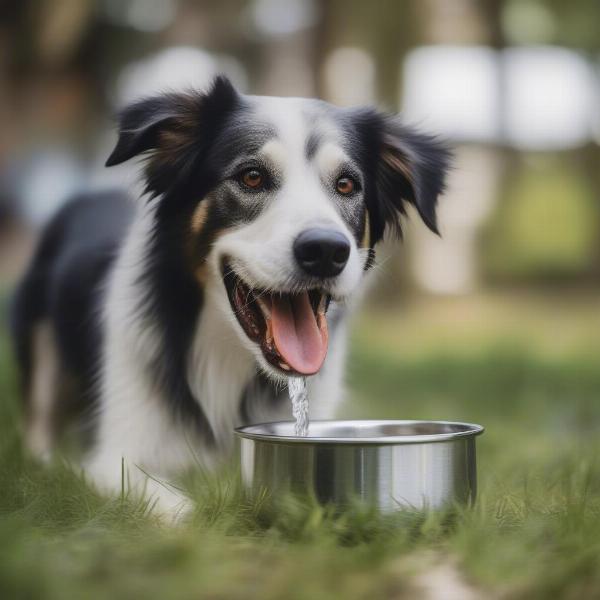Giardia in dogs is a common intestinal parasite that can cause a range of digestive issues. If you’re searching for “giardia dog poop picture” you’re likely concerned about your furry friend’s health and want to visually identify potential signs of this infection. This article will guide you through understanding what giardia is, how it affects your dog’s poop, and what steps to take if you suspect your dog has giardia.
Giardia is a microscopic parasite that thrives in contaminated water, soil, and feces. Dogs can contract giardia by drinking from infected water sources, coming into contact with contaminated feces, or even through grooming. While some dogs may show no symptoms, others can experience a range of digestive problems, including diarrhea, vomiting, and weight loss. One of the most telling signs of giardia is changes in your dog’s stool. However, it’s crucial to remember that visual identification isn’t foolproof, and a proper veterinary diagnosis is essential for effective treatment.
What Does Giardia Dog Poop Look Like?
The appearance of giardia-infected dog poop can vary. It can be soft, loose, watery, and often has a pale yellow or greasy appearance. Sometimes, there may be mucus present, giving the stool a slimy texture. The foul odor is also a common characteristic. While some dog owners report seeing blood in their dog’s stool when infected with giardia, this is less common.
Diarrhea associated with giardia can be intermittent, meaning it comes and goes, or it can be persistent, lasting for several days or even weeks. This inconsistency makes it crucial to monitor your dog’s stool regularly and consult a veterinarian if you notice any changes.
Diagnosing Giardia in Dogs
While looking at your dog’s poop can give you a clue, it’s important to remember that visual inspection alone cannot definitively diagnose giardia. Many other conditions can cause similar symptoms. A fecal examination by a veterinarian is necessary to confirm the presence of giardia.
Your veterinarian will perform a fecal flotation test, where a stool sample is mixed with a special solution that causes giardia cysts to float to the surface. These cysts can then be viewed under a microscope. In some cases, a fecal ELISA test may be used, which detects giardia antigens in the stool.
Treating Giardia in Dogs
If your veterinarian diagnoses your dog with giardia, they will likely prescribe an antiparasitic medication, such as fenbendazole or metronidazole. The medication is usually given for several days to effectively eliminate the parasite. It’s important to follow your veterinarian’s instructions carefully and complete the full course of medication, even if your dog’s symptoms improve.
Preventing Giardia Infection
Maintaining good hygiene is key to preventing giardia infection. Always pick up your dog’s poop immediately and dispose of it properly. Avoid letting your dog drink from stagnant water sources, such as puddles or ponds. Regularly cleaning your dog’s water and food bowls can also help prevent infection.
 Dog Drinking Fresh Water
Dog Drinking Fresh Water
Conclusion
Recognizing potential signs of giardia in your dog’s poop can be helpful in seeking timely veterinary care. While “giardia dog poop picture” can provide visual cues, remember that a definitive diagnosis requires professional examination. By understanding the symptoms, diagnosis, and prevention strategies, you can help keep your furry friend happy and healthy.
FAQ
- How long does giardia last in dogs? Giardia infections can last for several weeks, even with treatment.
- Can humans get giardia from dogs? While less common, it’s possible for humans to contract giardia from infected dogs, particularly if hygiene practices are not followed.
- What are the long-term effects of giardia in dogs? Untreated giardia can lead to chronic digestive issues and weight loss in dogs.
- How often should I clean my dog’s water bowl? Cleaning your dog’s water bowl daily is recommended to prevent bacterial and parasitic growth.
- Can giardia be cured in dogs? Yes, giardia can be effectively treated with appropriate medication prescribed by a veterinarian.
- Are there any home remedies for giardia in dogs? While some home remedies are suggested, consulting a veterinarian for proper diagnosis and treatment is always recommended.
- Can giardia come back after treatment? Reinfection is possible, especially if the dog is exposed to contaminated environments.
About ILM Dog
ILM Dog (https://ilmdog.com) is your trusted source for comprehensive information on dog care and well-being. We offer expert advice on various aspects of dog ownership, including health, nutrition, training, and breed selection. Our mission is to empower dog owners with the knowledge and resources they need to provide the best possible care for their canine companions. Contact us for personalized guidance: Email: [email protected], Phone: +44 20-3965-8624.